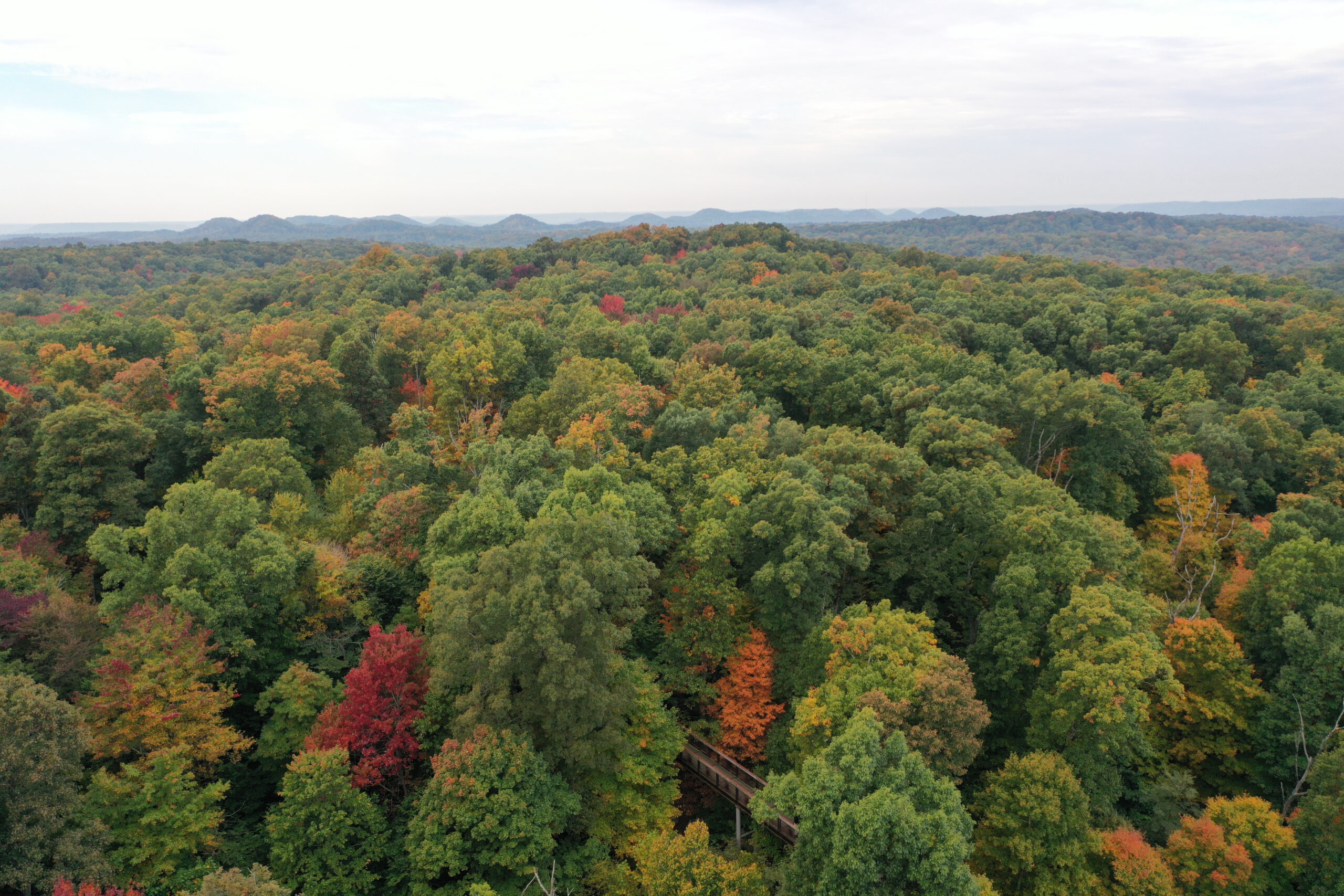By bernheim
LG&E is suing Bernheim for condemnation of our conservation land for a proposed natural gas pipeline. The Cedar Grove Wildlife Corridor is Bernheim’s recently protected 494 acres that have conservation easements and deed restrictions to ensure our commitment to managing the land for wildlife habitat, forested habitats, and prohibit non-conservation uses.
Bernheim is a non-profit, and for 90 years we have provided scenic beauty, clean air, clean water, wildlife habitat, and education for the greater Louisville community. This year, over 600,000 visitors have connected with nature. Thousands of supporters stand with Bernheim and have voiced opposition to LG&E’s condemnation of conservation land and asked for alternative solutions to be found.
Everyone who lives in or travels through Bullitt County sees the increasing loss of natural land, farmland, and scenic beauty. Signs of change are everywhere, including our scarred knobs along Interstate 65, ongoing construction of the new interchange south of Cedar Grove, permanent loss of some of the best farmland to industrial warehousing, to name a few. According to The American Farmland Trust, Kentucky lost 791,000 acres of farmland between 1992-2012. Bullitt County has tallied a substantial portion of this lost land, causing considerable changes on the landscape that permanently impact clean air, clean water, scenic beauty, wildlife habitat, and quality of life for residents.
Freedom of Information Act requests, and LG&E’s own admission show they requested confidential status while seeking approval for the pipeline. LG&E is studying at least 12 routes that target hundreds of landowners throughout Bullitt and Nelson counties. Its application with the Public Service Commission (PSC) for a certificate of public necessity was hidden within a 1,000-plus-page Rate Hike document, and Bernheim argues it was granted without proper procedure by the PSC.
Bottomline is that private landowners and neighbors’ rights should be protected against secretive planning using confidential practices. Most are still unaware that, in an effort to thwart opposition and keep land values low, LG&E was confidentially investigating their land and accessing their property records and land values through county PVA offices.
Throughout this process, they planned on taking land from farmers and homeowners even if they resisted. In a country that values property rights, we should all be concerned when energy companies target and investigate landowners while holding the threat of condemnation as a final tactic to ensure massive profits from customers.
TRUTH No. 1: Bernheim has been working for at least the past 10 years to protect the Cedar Grove Wildlife Corridor that is facing condemnation from LG&E for the natural gas pipeline.
Any notion that Bernheim protected this land to stop the pipeline fails to consider the true value of this effort and the difficulties in protecting conservation land as a non-profit organization. From our perspective, this protected natural land is the real “public necessity.”
The process for protecting the Cedar Grove Wildlife Corridor included more than 1,500 acres of forest from multiple landowners using conservation grants from Imperiled Bat Conservation Fund of the U.S, Fish and Wildlife Service, Kentucky Heritage Land Conservation Fund, private donors, and Bernheim funds. Protecting the land dates back to 1929 with the original I.W. Bernheim purchase. More recent land protections bordering the original 1929 purchase were in 2015 with the Cave Hollow Tracts, then extended by the 954 acre Big Level tracts in 2017 and the 494 acre Cedar Grove tracts in October 2018.
Protecting this land took many years, extending well before 2017 and likely for a longer period than LG&E has been considering this route. Previous landowners declined the company’s attempts for a pipeline easement and sold the land to Bernheim with the intention of seeing it protected. We have the right as private landowners and purchasers of the property to do as we see fit and live up to our obligations as good stewards of the land.
TRUTH No. 2: Bernheim continues to demonstrate the ecological values of Cedar Grove Wildlife Corridor, as was originally required in the applications we submitted for conservation funding in 2017.
Surveys for bats, plants, snails, cave species, birds, and cultural features have led to incredible discoveries throughout the Cedar Grove Wildlife Corridors.
We work with universities, state and federal agencies, citizen scientists, and environmental contractors to study our biodiversity and natural features.
We have documented critically endangered species including Indiana bat, northern long-eared bat, cave beetle, the hidden springsnail, bluff vertigo snail, historical sites, and pristine limestone springs along the Cedar Grove Wildlife Corridor.
TRUTH No. 3: No one knows the permanent impacts of this easement and the ensuing pipeline.
We are sure that forests would be bulldozed, streams would run muddy, rock outcrops would be blasted, the ground dug up and pipe laid. But what comes next?
Any notion of minimized environmental damage is purely hypothetical and fails to recognize that this easement will last forever. As Bernheim will manage this land for many centuries to come, LG&E’s permanent existence would at minimum be a hindrance to our conservation goals and at most be an environmental and safety disaster.
Most importantly, natural lands protected by conservation easements should not be subjected to condemnation. The breaking of these legal protections would jeopardize all protected land in the state of Kentucky and beyond.
TRUTH No. 4: Bernheim is not the only impediment to LG&E’s faltering pipeline project.
LG&E has filed condemnation lawsuits against at least 10 landowners and state agencies, as well as an energy company with existing easements. All these entities, including Bernheim, have resisted the company’s attempt to take land through condemnation for their proposed natural gas pipeline. This resistance has many reasons: a belief in private landowner property rights; concerns for safety while living and working next to a natural gas pipeline; permanent damage to the environment; loss of use on their land; and mistrust of LG&E due to secretive practices in planning and obtaining easements.
LG&E still has not received all required permits for this proposed pipeline project. Some previously granted are now being challenged by numerous landowners and organizations.
Bernheim’s reasons for resisting LG&E’s request for an easement are unwavering. First, a conservation easement and deed restrictions on our land prohibit granting the requested pipeline easement. Second, Bernheim does not view the pipeline as compatible with our long-term goals for the Cedar Grove Wildlife Corridor.
For more information on our fight against LG&E’s condemnation lawsuit, please visit ForestUnderThreat.com and learn how you can stand with Bernheim in opposition to this threat against our conservation land.

